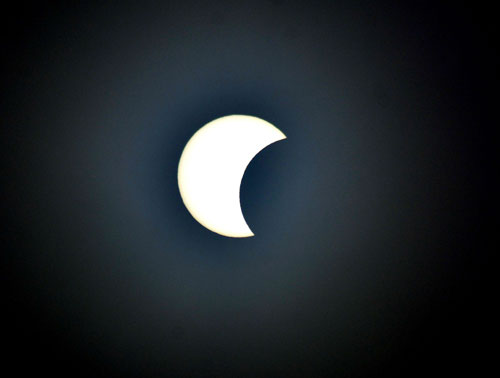Observer Report
Islamabad/Karachi
Pakistan on Thursday observed the annular solar eclipse after 20 years. The eclipse began at 8:58 am (local time), turning into a total eclipse and lasted for almost 2 hours, and ending at 10:19 am.
In Karachi, the eclipse started at 7:30am, turning into total eclipse at 8:46am. In Islamabad, the total eclipse happened at 8:58am.
Many countries in Asia witnessed a solar eclipse, as well as some parts of eastern Africa and northern Australia, but a small area experienced an annular solar eclipse called a ‘ring of fire’ eclipse.
A solar eclipse happens when the moon passes directly between the Earth and the sun, but the type of eclipse that unfolds depends on how far away the moon is from the Earth.
But it will be an annular eclipse as the moon was not quite large enough to cover the entire sun, leaving behind a ring of light, it is also called ‘ring of fire’ eclipse.
Special prayers called ‘Salatul Kasuf’ were offered at multiple places across country.
Professor Dr Muhammad Jawed Iqbal, Institute of Space and Planetary Astrophysics (ISPA), Karachi University. warned people not to look directly at the sun without any protective eye apparatus as it could damage their eyesight. The radiation will be much more direct than it was during the last solar eclipse that occurred 20 years ago, he said.
Dr. Iqbal said elaborate arrangements to observe the annular solar eclipse, with due provision for needed safety, have been made at the Astronomical Observatory.
According to the experts and the researchers, that the sun can be viewed safely using the naked eye only during a total eclipse, while during partial and annular solar eclipses, the sun should not be viewed without proper equipment and techniques.
It is pertinent to remember that such eclipse was last observed in Pakistan in 1999.










